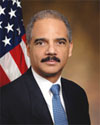Obama DOJ says DOMA is unconstitutional
The Obama administration made a blockbuster announcement Wednesday, saying it has concluded that one part of the Defense of Marriage Act will not be able to pass constitutional muster in the 2nd Circuit and that DOJ would not defend that part of the law in two pending cases in that circuit.
It was a dramatic, unexpected, and significant move by the Obama administration and one that could trigger maneuvers by DOMA supporters to appoint an intervenor to defend the law. But beyond the eventual legal consequences of the announcement, the political impact was characterized by most LGBT leaders as historic and monumental.
“This is a monumental turning point in the history of the quest for equality for lesbian, gay and bisexual people,” said Jon Davidson, legal director for Lambda Legal Defense and Education Fund.
NCLR Executive Director Kate Kendell put it even more strongly.
“The President’s leadership on this issue has forever changed the landscape for LGBT people in this country,” said Kendell. “For the first time, the President and the Department of Justice have recognized that laws that harm same-sex couples cannot be justified. This is the beginning of the end, not just for the mean-spirited and indefensible Defense of Marriage Act, but for the entire panoply of laws that discriminate against same-sex couples.”
Attorney General Eric Holder announced Wednesday that the Department of Justice would not defend the constitutionality of Section 3 of the Defense of Marriage Act (DOMA) in two of the four cases where that section of the law is currently under challenge. Those two cases are Pedersen v. OPM, filed by Gay & Lesbian Advocates & Defenders, and Windsor v. United States, filed by the ACLU.
Two other cases—in the First Circuit—also challenge Section 3, which prohibits federal recognition of any same-sex marriage, as does a more narrow case, Golinski v. OPM, in the 9th Circuit, at the district court level.
DOMA Section 2, which enables states to ignore valid marriage licenses issued to same-sex couples from other states, has not yet been challenged in court and Holder made no reference to it.
Since entering the White House, President Obama has said that DOMA should be repealed, but his administration continued to defend the law, saying, through various spokespersons, that Obama was concerned about setting a precedent that would make it easier for some future administration to pick and choose which laws it would defend.
Last summer, asked whether there isn’t a difference between enforcing existing laws and defending them in court, his Domestic Policy chief, Melody Barnes, said the president believed DOMA and Don’t Ask, Don’t Tell to be “discriminatory” but that he had not yet “made an argument” concerning their constitutionality.
“[W]e believe we have an obligation to defend the law if Congress had a rational basis for passing the law,” said Barnes.
In his announcement Wednesday, Attorney General Holder noted that the administration would still defend DOMA Section 3 in the two First Circuit cases because the First Circuit has ruled that rational basis is sufficient justification for treating people differently based on their sexual orientation. (He was apparently referring to the unsuccessful class action case challenging Don’t Ask, Don’t Tell). But Holder also noted that DOJ attorneys would argue that the court should, instead, apply a stricter test for DOMA.
Lambda Marriage Project Director Jenny Pizer said the First Circuit would make its own decision about whether to adopt Holder’s view.
“Any court is going to make its own determination about what the law requires,” said Pizer. “The government is usually given particular credence, but it is always court’s job to decide what the law requires.” But Pizer noted that the increasing volume of voices declaring the injustice of DOMA can have an influence, particularly given that the arguments made in support of DOMA “are not even coherent.”
It is possible –just as happened in California— that some other entity might attempt to mount its own defense of DOMA in the pending cases. Last October, U.S. Rep. Lamar Smith (R-Texas) filed a motion in the two First Circuit cases, seeking to be named intervenor-defendant. Smith, aided by the right-wing Alliance Defense Fund, said at the time that the Justice Department was providing “no defense at all” for DOMA. He withdrew his motion a few weeks later, without comment.
Lambda’s Pizer said she thinks it is “very likely” someone will ask the First Circuit for permission to serve as a defendant-intervenor in the DOMA cases. And she noted Congress has the authority to appoint its own counsel to defend the law. Such was the development in the California same-sex marriage case, Perry v. Schwarzenegger. The federal district court allowed the group that sought passage of Proposition 8, Yes on 8, to defend the law at trial. The 9th Circuit recently asked the California Supreme Court to determine whether any state law gives Yes on 8 the authority to appeal that district court decision in the federal appeals court.
A three-judge panel of the First Circuit is currently receiving written briefs from both sides in the DOMA cases and, presumably, will now receive a written brief from DOJ arguing that DOMA Section 3 should meet a heightened standard of review.
NCLR’s Minter said he believes the law “can’t survive” that standard.
Mary Bonauto, lead attorney on the DOMA cases for GLAD, could not be reached for comment. But ACLU Executive Director Anthony Romero, executive director of the ACLU, which has filed one of the Second Circuit cases, praised President Obama doing “the right thing.” Romero said President Obama’s action has “just propelled gay rights into the 21st century, where it belongs. Our government finally recognizes what we knew 14 years ago—that the so-called ‘Defense of Marriage Act’ is a gross violation of the Constitution’s guarantee of equal protection before the law. DOMA betrays core American values of fairness, justice and dignity for all, and has no place in America.”



Leave a Reply